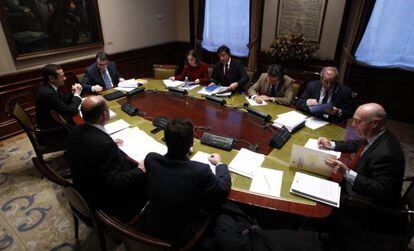Spain’s main political groups agree on stricter party financing controls
Packet of anti-corruption rules includes ban on banks writing off parties’ debts


Faced with mounting public disaffection and a groundswell of support for new anti-corruption party Podemos, which is promising to sweep them off the board, Spain’s main political parties are making moves to stifle corrupt practices associated with party financing, internal organization and the remuneration of high-ranking public officials.
After meeting three times, spokespeople for all the groups represented in parliament have agreed on several measures, which still need final congressional approval.
Individual donations have been reduced, while corporate donations are being banned altogether
One of them is to prohibit banks from writing off the debt of political parties, a practice that has been common throughout Spain’s democratic history.
Donations by individuals have also been reduced from an annual €100,000 to €50,000, while corporate donations are being banned altogether.
“There is a general agreement on the need for accountability, oversight and leading by example,” said José Antonio Bermúdez de Castro, secretary general of the Popular Party group.
Under the agreed new measures only party members will be able to donate funds, and any amounts upwards of €10,000 will be made public. When the reform first made it through the Cabinet, the amount had been set at €25,000.
Another relevant change is that illegal party financing will now be included as a crime in the penal code, a measure that all parties had avoided taking in the more than three decades that have passed since Spain returned to democracy.
Prime Minister Mariano Rajoy originally announced the packet of measures in late November in a bid to demonstrate a rigorous attitude towards corruption in politics. In October, the Spanish leader had been forced to issue a public apology “in the name of the Popular Party” after another major bid-rigging scandal involving the conservative party made headlines.










































